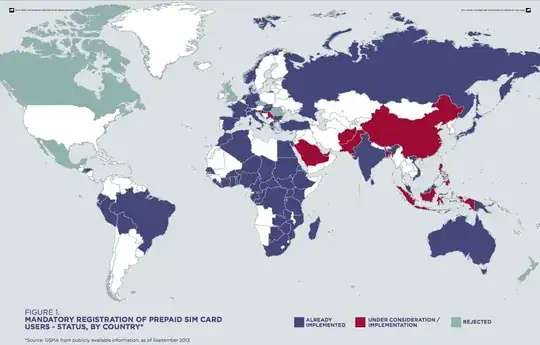GSM Association in 2013 has published white paper, which strongly suggests that there is no evidence proving any reduction in crime or terrorism.

Excerpts from summary:
An increasing number of governments have
recently introduced mandatory registration
of prepaid SIM card users, primarily as a
tool to counter terrorism and support law
enforcement efforts. However, to date there is
no evidence that mandatory registration leads
to a reduction in crime.
A number of other governments, including
those of the United Kingdom, the Czech
Republic, Romania and New Zealand,
have considered mandating prepaid SIM
registration but concluded against it.
While these governments’ detailed policy
assessments have not been published, reports
have highlighted the absence of evidence —
in terms of providing significant benefits for
criminal investigations — as a key reason for
rejecting this policy. In Mexico, mandatory
SIM registration was introduced in 2009
and repealed three years later after a policy
assessment showed that it had not helped
with the prevention, investigation and/or
prosecution of associated crimes.
Chapter 3 of the aforementioned white paper:
While there is no doubt that criminals and
terrorists use prepaid SIM cards to help stay
anonymous and avoid easy detection, to
date there has been no empirical evidence to
indicate that:
- Mandating the registration of prepaid
SIM users leads to a reduction in criminal
activities; and
- The lack of any registration of prepaid SIM
users is linked to a greater risk of criminal or
terrorist activities.
In fact, a publicly available policy assessment
report from Mexico showed that mandatory
SIM registration—introduced there in 2009—
had failed to help the prevention, investigation
and/or prosecution of associated crimes. As
a result, policymakers decided to repeal the
regulation three years later (see case study 1).
The absence of a link between mandatory
SIM registration and crime reduction suggests
that criminals who are determined to remain
anonymous will use other means to obtain
active SIM cards or simply buy them from abroad
and roam on their own countries’ networks.
A number of governments, including in Canada,
the Czech Republic, New Zealand, Romania
and the United Kingdom have considered the
merits of mandating prepaid SIM registration but
subsequently concluded against introducing it.
In the United Kingdom for example, this issue
was considered in detail by an expert group
of law enforcement representatives, security
and intelligence agencies and communications
service providers following the terrorist attack
on London in July 2005. A confidential report
by experts concluded that “the compulsory
registration of ownership of mobile telephones
would not deliver any significant new benefits
to the investigatory process and would dilute
the effectiveness of current self-registration
schemes.”
In the European Union, some Member States
have adopted measures requiring SIM card
registration, and the European Commission (EC)
invited all Member States in 2012 to provide
evidence of the actual or potential benefit
of such measures. Following examination of
the responses, Cecilia Malmström, European
Commissioner for Home affairs noted that:
“At present there is no evidence, in terms of
benefits for criminal investigation or the smooth
functioning of the internal market, of any need
for a common EU approach in this area.”
Case study of Mexico mentioned above:
In Mexico, mandatory SIM registration was
introduced in 2009 but repealed three
years later after a policy assessment
showed that it had not helped the
prevention, investigation and prosecution of
associated crimes. The reasons cited by the
senate for repealing the regulation included:
(i) Statistics showing a 40 per cent increase
in the number of extortion calls recorded
daily and an increase of eight per cent
in the number of kidnappings between
2009 and 2010;
(ii) The appreciation that the policy was
based on the misconception that
criminals would use mobile SIM cards
registered in their names or in the name
of their accomplices. The report
suggests that registering a phone not
only fails to guarantee the accuracy of
the user’s details but it could also lead
to falsely accusing an innocent victim of
identity theft;
(iii) The acknowledgement that mobile
operators have thousands of
distributors and agents that cannot
always verify the accuracy of the
information provided by users;
(iv) Lack of incentives for registered users
to maintain the accuracy of their
records when their details change,
leading to outdated records;
(v) The likelihood that the policy
incentivised criminal activity (mobile
device theft, fraudulent registrations
or criminals sourcing unregistered SIM
cards from overseas to use in their
target market); and
(vi) The risk that registered users’ personal
information might be accessed and
used improperly.
